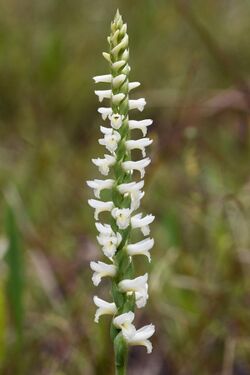Biology:Spiranthes magnicamporum
| Spiranthes magnicamporum | |
|---|---|

| |
| Scientific classification | |
| Kingdom: | Plantae |
| Clade: | Tracheophytes |
| Clade: | Angiosperms |
| Clade: | Monocots |
| Order: | Asparagales |
| Family: | Orchidaceae |
| Subfamily: | Orchidoideae |
| Tribe: | Cranichideae |
| Genus: | Spiranthes |
| Species: | S. magnicamporum
|
| Binomial name | |
| Spiranthes magnicamporum Sheviak
| |
Spiranthes magnicamporum, commonly called the Great Plains lady's tresses,[1] is a species of orchid that is native to North America. It is primarily native in the Great Plains, but there are outlying populations in the east in areas of former natural grassland, such as the Black Belt prairies of the Southeast. It is found in both fens and wet and dry prairies, often in calcareous soil.[2]
Description
It is a perennial that produces a spiral of white flowers in the fall. It is closely related to the Spiranthes cernua complex, and it was not recognized as a separate species until the 1970s. S. magnicamporum can be distinguished by its much stronger scent, later flowering time, and lateral sepals that spread over the top of the flower.[3][4] The scent of the S. magnicamporum is comparable to the smell of coumarin.[5]
Distribution
The Lady's Tresses occurs mostly in the United States of America and part of Canada.[6][7][8]
Ecology
Interactions between Lady's Tresses and Its pollinating partners have only been explored in the Southern Plain Population.[9] The most common pollinators are the southern plain bumble bees, the sweat bees, eastern carpenter bees, two-spotted bumble bees.[9] Studies on Mycorrhizal associations for Lady's Tresses have not been conducted.
References
- ↑ "Spiranthes magnicamporum". Natural Resources Conservation Service PLANTS Database. USDA. https://plants.usda.gov/core/profile?symbol=SPMA5. Retrieved 27 November 2015.
- ↑ Flora of North America
- ↑ University of Michigan Herbarium
- ↑ Chicago Wilderness Magazine
- ↑ Luer, Carlyle A. (1975). The Native Orchids of the United States and Canada Excluding Florida. (1st ed.). Bronx, NY.: New York Botanical Garden.. pp. 201.
- ↑ "Search" (in en). https://www.gbif.org/occurrence/map?country=US&taxon_key=2805431.
- ↑ Brunton, Daniel (January 2015). "Great Plains Ladies’-Tresses (Spiranthes Magnicamporum) in the Lower Great Lakes Region and a New Record for New York State.". Canadian Field-Naturalist 129 (2): 183–188. https://www.canadianfieldnaturalist.ca/index.php/cfn/article/download/1700/1694/6717.
- ↑ Catling, Paul (January 1976). "Spiranthes Magnicamporum Sheviak, an Addition to the Orchids of Canada.". Canadian Field-Naturalist 90 (1): 467–470. https://www.canadianfieldnaturalist.ca/index.php/cfn/article/download/1518/1536/6046.
- ↑ 9.0 9.1 Barlow, Phillip (January 2023). "Insect Interactions of Spiranthes Magnicamporum (Orchidacea) in the Black Belt Prairie of Mississippi". Southeastern Naturalist 22 (1): 28–35. https://bioone.org/journals/southeastern-naturalist/volume-22/issue-1/058.022.0103/Insect-Interactions-of-Spiranthes-Magnicamporum-Orchidacea-in-the-Black-Belt/10.1656/058.022.0103.full.
Wikidata ☰ Q15450554 entry
 |

